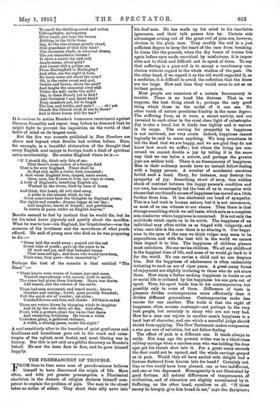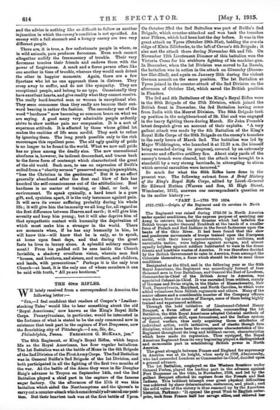THE FREEMASONRY OF TROUBLE.
FROM time to time some man of pseudo-science believes himself to have discovered the origin of life. More often, and with yet greater presumption, a Pharisaical charlatan in the domain of religion declares himself com- petent to explain the problem of pain. The man in the street takes no notice of either. They about their silly news into his deaf ears. He has made up his mind to his inevitable ignorance, and their talk passes him by. Certain side advantages arising out of the great evil of pain are, however, obvious to the plain man. They modify the evil in a just sufficient degree to keep the heart of the race from breaking. In times like the present, when the dry bones of truism live again before eyes made uncritical by misfortune, it is impos- sible not to think and difficult not to speak of them. To say that suffering is a pure evil is to accept a reactionary con- clusion without regard to the whole wisdom of the past. On the other hand, if we regard it as the old world regarded it, as a medicine, it is difficult to avoid the reflection that the doses are too large. Now and then they would seem to act as an irritant poison.
Most people are conscious of a certain freemasonry in trouble. There is no bond like distress. That is, we suppose, the boat thing about it ; perhaps the only good thing which those in the midst of it can see. No other touch of nature proclaims kinship in the same degree. The suffering form, as it were, a secret society, and are revealed to each other in the cruel clear light of catastrophe. Toy is also a bond, but it binds leas tightly and is narrow in its scope. The craving for sympathy in happiness is not universal, nor very acute. Indeed, happiness cannot logically be said to crave anything. We long sometimes to tell the dead that we are happy, and we are glad they do not know how much we suffer; but where the living are con- cerned we cannot double a joy by telling it in the same way that we can halve a sorrow, and perhaps the greater joys are seldom told. There is no freemasonry of happiness. Men in their ordinary moods have no instant fellow-feeling with a happy person. A number of accidental emotions forbid such a bond. Envy, for instance, may destroy the sympathy of joy. Something short of envy, that sudden shock of contrast between the happy person's condition and our own, has occasionally led the beet of us to recognize with shame that our friend's access of happiness has moved tui a little farther from him. It has slackened our bond of sympathy. This is a bad trait in human nature, but it is not uncommon, as most of us can witness to our shame. Then there is that strange something which we call taste, which sots as a complete non-conductor where happiness is concerned. It is not only the multitude which repels us in its mirth. The happiness of an individual may often strike us as tinged with vulgarity, and when once this is the case there is no sharing it. Our happi- ness in the eyes of the man we think vulgar may seem to be supercilious, and with the best will in the world we cannot then impart it to him. The happiness of children pleases most onlookers. No one envies children. We all say childhood is the happiest time of life, and none of us would go back to it for the world. No one envies a child and no one despises him. But the happiness of adolescence is often undeniably irritating to such as are of riper years. A great many forms of enjoyment are slightly irritating to those who do not share them. How many a father seeking happiness in hooka or art or social life is irritated by the happiness his eon gets out of sport. True, his sport binds him to his contemporaries, but possibly only to some of them. Difference of taste in pleasure divides contemporaries more effectually than it divides different generations. Contemporaries make leas excuse for one another. The truth is that the sight of happiness often arouses contempt—not perhaps in the very best people, but certainly in many who are not very bad. How far a man can rejoice in another man's happiness is a hard test of character, and one which a merciful judge should shrink from applying. The New Testament makes compassion a sins qua non of salvation, but not fellow-feeling.
The effect of pain is a different one. It tends always to unify. Not long ago the present writer was in a third-class railway carriage when a careless man who was holding the door ajar got his thumb shut into it. For a great many second. the door could not be opened, and the whole carriage gasped as in pain. Would they all have smiled with delight had • fortune fluttered from heaven into his hand ? Certainly not. One or two would have been pleased, one or two indifferent, and one or two depressed. Homogeneity is not illustrated by good fortune. All natural differences of temperament, of civilization, and of education are slightly accentuated by it. Suffering, on the other band, equalizes us alL "If thine enemy be hungry, give him bread to eat," says the Beriptare;
and the advice is nothing like so difficult to follow as another injunction in which the enemy's condition is not epecified. An enemy with a full stomach and a hungry enemy are two very different people.
There are, it is true, a few unfortunate people in whom, as in wild animals, pain produces fierceness. Even such cannot altogether nullify the freemasonry of trouble. Their very fierceness touches their friends and endows them with the power of forgiveness. A. meek and a fierce person often like one another in time of trouble, whereas they would each detest the other in happier momenta. Again, there are a few Spartans who let no one approach them in distress. They creep away to suffer, and do not like sympathy. They are exceptional people, and belong to no type. Occasionally they have excellent hearts, and give readily what they cannot receive. The really hard.hearted man or woman is exceptional also. They seem commoner than they really are because their out- ward bearing is rather the fashion. The secondary use of the word " hardneas " now becoming so common bears on what we are saying. A good many very admirable people ardently strive to show neither pain nor compassion. It is a sort of superman attitude. It is affected by those whose gilded lot makes the realities of life seem sordid. They seek to refine by ignoring them. The long youth possible only to the rich encourages this repellent pose. The old ugly quality of pride is no longer to be found in the world. What we now call pride has no place among the deadly sins. The new unemotional aloofness is, however, its indirect descendant, and traces back to the fierce form of contempt which characterized the great of the old world. Such men, to use an expression of Swift's culled from a "charity sermon " preserved among his pamphlets, "lose the Christian in the gentleman." But it is an effort generally abandoned after the first real blow of fate has knocked the self.consciouaness out of the attitudinizer. Real hardness is no matter of training, or ideal, or lack, or environment. To speak cynically, a hard heart is a pare gift, and, cynicism apart, it is the only insurance against pain. IL will save its owner suffering probably during his whole life ; it will give him the immunity we all long for, all regard as the first difference between Heaven and earth; it will give him serenity and keep him young ; but it will also deprive him of that sympathetic contact with humanity the deprivation of which must make him a stranger in the world. There are moments when, if he has any humanity in him, he will know this—will know that he is only, so to speak, at home upon feast days, and that during the great fasts he liven in luxury alone. A splendid solitary confine- ment I From hie padded cell he sees inside the Church Invisible, a shadowy cruciform vision, wherein men find houses, and brethren, and sisters, and mothers, and children, and lands, with persecutions." Perhaps it is the only true Church—at least, it is the only one of whose members it can be said with truth, " All ye are brethren."



































 Previous page
Previous page